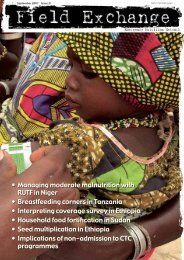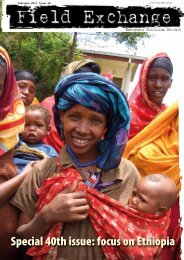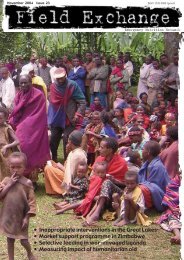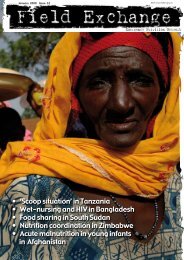News & ViewsUpdate fromFood Security,Livelihoods& HIV/AIDSWorkingGroupAn AIDS orphan collects her food rationAsecond meeting of the FoodSecurity, Livelihoods &HIV/AIDS Working Group(WG), co-chaired by RebeccaBrown (AAH) and Laura Phelps(Oxfam), was held on Tuesday 20thApril 2004. The premise for the WG,which first met in December 2003, wasto fill a perceived gap and provide anongoing forum for exchanging views,skills and knowledge about FoodSecurity and Livelihoods in the contextof HIV and AIDS 1 .The meeting began with a summaryby the co-chairs of the main points ofthe previous meeting, with introductionsincluding Mick Matthews,Secretariat of the UK Consortium onAids and International Development.New agency members to the group,Concern Worldwide, CAFOD and TearFund, gave short presentations on theiragency experiences relating toHIV/AIDS, while SC UK presented ona guide to the many issues needing tobe considered when carrying outassessments or planning interventions.Concern WorldwideDescribing Concern’s approach to18mainstreaming HIV/AIDS, Paul Rees-Thomas outlined a recent internal auditthat found an awareness of HIV/AIDSpolicy within the organisation, progressin terms of personal awareness, e.g.development of a critical illness policy,with further work needed, andongoing, on mainstreaming HIV/AIDSin programmes throughout the Concernnetwork 2 .Other areas considered relevant to theWorking Group included:• A Livelihoods Policy based uponlabour reduction approaches.• Consideration of proxy indicatorsas an aid in targeting vulnerability.• Exploring geographical andregional differences.• Community based approaches tomanaging severe malnutrition, mayoffer a potential entry point tocommunities of people living withHIV/AIDS (PLWHA).• Comparing emergency responsemodels as a platform for medium tolong-term responses.• Looking at local productioninitiatives since emergency feedingactivities are ultimately notsustainable in the longer term.John Cosgrave, Zimbabwe, 2003CAFODAnn Smith described how CAFOD is a partnership-based organisationworking primarily with and through field partners, withregional offices in Harare and Nairobi. There is a four person HIVSupport Section although this is about to be restructured. HIV isnow being mainstreamed into thinking in all aspects of CAFOD’swork. Since 1994/95, CAFOD have consistently worked at incorporatingHIV perspectives into emergency response. However,translating theory into practical implementation has been a slowprocess. There is still a discrepancy between what CAFOD aresaying and what they are doing. Food distribution through homebased care programmes has now reached the point where there isuncertainty as to the way forward while efforts are being made toaccount for HIV in livelihoods programming.Tear FundHIV is Tear Fund’s main strategic priority and is mainstreamedacross the 4 pillars of the agency’s strategy: disaster management,advocacy, community development and pro-poor economicempowerment. Amy Slorach described how this developed froman internal review and pressure from partners for Tear Fund.Demands from partners have included the need for a differenttype of food basket to address the needs of people living withHIV/AIDS, and the need for more sophisticated targeting of foodbaskets linked to household size. Ongoing questions for TearFund include how to integrate HIV/AIDS into food security andother programmes, how to address the issue of sustainability, andhow to address the issues for partner organisations affected byHIV and AIDS. Tear Fund has engaged ACET consultancy to workwith partners and a report will be produced shortly which will beshared with other agencies.Save the Children UKMichael O’Donnell presented some key points from a draftpaper 3 , intended for both managers and technical staff working oneither food security or HIV/AIDS and reproductive health. Itfocuses on the economic impact of AIDS, highlights the linkagesbetween HIV/AIDS and reproductive health, and considers howto translate these linkages into programming.The remainder of the meeting explored whether there is a needfor a working group and, if so, what should be the focus of activity.Key points to emerge were:• Before undertaking external advocacy, the group shouldcarry out some internal research to highlight commonalitiesamongst the agencies involved. Internal summaries oforganisational strengths and weaknesses in terms ofHIV/AIDS programming would be useful.• There is a need for the WG to focus on more specific fields ofactivities within the sector. Exploring a specific issue at eachmeeting was suggested as one way of maintaining focus.• The group could provide a forum to stimulate and engagein discussion about how we understand the problems andaddress solutions. Sharing the Working Group thinkingwith field partners would be valuable to get guidance onwhat the group should be considering.• Potential joint projects between agencies should be explored,and may simply mean defining pieces of work each isdoing and comparing and sharing the resultsThe meeting concluded that there is a need to document thewealth of field experience, especially in high HIV prevalenceareas, and use this to develop an advocacy or programming tool.It was agreed that operating within the UK Consortium structurewould facilitate the working group’s activities. The nextmeeting is scheduled for July 20th, and will likely focus on termsof reference for working within the Consortium, identifying nextsteps and further sharing of agency experiences.For further information, or to contribute ideas on what you thinkthe group should be looking at, contact: Laura Phelps, email:lphelps@oxfam.org.uk or Rebecca Brown, email:r.brown@aahuk.orgProceedings of the working group meetings can be viewed onthe UK Consortium website, http://www.aidsconsortium.org.uk1See <strong>Field</strong> <strong>Exchange</strong> 22, HIV/AIDS and Food Security, summary of meeting, p22-232Further suggestions from discussions:A Toolkit, Guide for NGOs managing HIV/AIDS in the workplace is produced bythe UK Consortium and available from the websitehttp://www.aidsconsortium.org.uk.Also Plan International suggested as a reference for mainstreaming HIVthroughout organisations, see http://www.plan-international.org3Presentation by Michael O’Donnell, SC UK based upon draft paper, FoodSecurity, Livelihoods & HIV/AIDS: A Guide to the Linkages, Measurement &Programming Implications. Available from – Michael O’Donnell,email: m.o’donnell@savethechildren.org.uk
News & ViewsFAO/WHOMeeting Warn ofContaminatedInfant FormulaPeople caring for infants at high risk ofinfection should be warned thatpowdered infant formula is not a sterileproduct, a joint Food andAgricultural Organisation (FAO) and WorldHealth Organisation (WHO) meeting hasconcluded, and recently highlighted in a BMJnews piece 1 .Attended by experts, the joint FAO/WHOworkshop on Enterobacter sakazakii and othermicro-organisms in powdered infant formulafound that intrinsic contamination of powderedinfant formula with E sakazakii andSalmonella had caused cases of infection andillness in infants, including severe disease, andcould lead to serious developmental sequelaeand death.Neonates (up to 4 weeks of age), particularlythose born prematurely, with low birthweight,or immunocompromised babies, wereconsidered to be at greatest risk of E sakazakiiinfection. Infants of HIV positive mothers werealso at risk because they may require infantformula and may be more susceptible to infection.E sakazakii has been implicated in outbreakscausing meningitis or enteritis. In the fewoutbreaks reported, the death rate amonginfants who contracted the disease rangedfrom 20% to over 50%, while some survivorsexperienced severe lasting complications. Thebacterium has been detected in a range offoods, but only powdered infant formula hasbeen linked to outbreaks of disease. Its prevalenceis unknown.The expert meeting recommended thatcarers, particularly of high risk infants, shouldbe encouraged to use commercially sterileliquid formula or formula that has undergonean effective decontamination procedure, suchas using boiling water to reconstitute formulaor heating reconstituted formula.The meeting was called in response to arequest made by the Codex Committee onFood Hygiene for scientific advice to be used inthe revision of the Recommended InternationalCode of Hygienic Practice for Foods for Infantsand Children. On the basis of its findings, theworkshop recommended that the code shouldinclude microbiological specification for Esakazakii in powdered infant formula.A summary report of the joint FAO/WHOworkshop on E sakazakii and other microorganismsin powdered infant formula isavailable athttp://www.who.int/foodsafety/micro/meetings/feb2004/en/1News extra. FAO/WHO meeting warns of contaminationof powdered infant formula. BMJ 2004;328:426 (21February). See online athttp://bmj.bmjjournals.com/cgi/content/full/328/7437/426-d?etocDear EditorI was amazed, and greatly disappointed,to read the report of the workshopon Community Based Approaches toManaging Severe Malnutrition, and thepiece on this subject in <strong>Field</strong> <strong>Exchange</strong>,March 2004, pp 16-19. Why was there nomention, whatsoever, about any of themicronutrient deficiencies? These almostinvariably accompany severe proteinenergymalnutrition, and therefore constitutea very important part of "severemalnutrition". All those concernedshould surely know that deficiency ofvitamin A, iron, iodine, and zinc, andpossibly others, are responsible in largepart for the very high rates of mortalityand morbidity among young childrenand pregnant and lactating women, andothers, in developing countries. I find itironic that on the very next pages youhave printed an excellent article by DrAndre Briend, which rightly drawsattention to the scandal, and reflects anarea in which I was actively involved inover several decades, in trying to combatthe criminal micronutrient inadequacy ofmany refugee rations. The most startlingfeature of Table 1 in Dr Briend’s article isthe absence of both vitamins A and C.Even to this day, there are constantlyrecurring reports of frank scurvy andDear EditorThe targeting of food aid is widelyassumed to be the most effective andefficient way of ensuring that the limitedfood aid resources available in emergenciesreach those who need them most.Targeting is conducted at multiplelevels - from the selection of countries,down to the selection of individuals whowill receive it and those that won't. Foodaid targeting is a central aspect of thefood aid system, which is itself drivenby multiple objectives: shifting surpluses,keeping world prices high, humanitarian,political contract between countries,etc. This means that the quantityand quality of food aid at any givenemergency is unlikely to be commensuratewith the need experienced by thoseaffected by the emergency. Within thiscontext, humanitarian agencies are oftenrequired to target food aid to the householdsor individuals that need it most.In most emergency situations, it is notpossible to target food aid more specificallythan to geographical areas 1 . Thecontexts where within-community targetingof households is possible are veryfew, unless costly administrative systemsare put in place (which out-weigh thecost savings of targeting). Wide implementationof feeding programmes, oftenin the absence of a general householdration, can ensure that certain individualsreceive food (there are few guaranteesthat these individuals will consumethe food). These programmes rarelycontribute to the longer term viability ofthe household and targeted individualsnon-blinding and blinding xerophthalmia.Yours faithfullyDonald S. McLaren, MD, PhD, FRCPThe ENN would like to point out that thereport referred to in the letter above was theproceedings of a meeting summarised by theENN, and included with issue 21 of <strong>Field</strong><strong>Exchange</strong>. While micronutrient deficiencieswere discussed at the meeting, the main focusof discussions was around the ‘new’ strategyof addressing severe malnutrition throughcommunity based care. It should also be notedthat all diets used in projects described in theDublin report used foods that were highlyfortified with all micronutrients (along theWHO recommendations for F100 rehabilitationdiets). Nonetheless, Dr. McLaren’s letter,and the article by Andre Briend to which herefers, do highlight how we can never becomplacent about micronutrient deficiencies.Sadly, the steady flow of articles about micronutrientdeficiency outbreaks in humanitariancrises received by the ENN and oftenpublished in <strong>Field</strong> <strong>Exchange</strong> bear testimonyto this.are likely to experience very low recoveryrates because, in fact, the targetinghas failed and food is shared or replacesthe normal diet. Food for work is rarelypractical in an emergency, because of theadministrative burden it carries.Targeting according to socio-economiccriteria can only feasibly be done usingcommunity managed approaches andonly then, in stable communities, whereneeds vary considerably between householdsand food is sufficient to addresshouseholds' food deficit.In practice, however, these approachesare applied in many emergencysituations. Monitoring and evaluation isvery poor and rarely documented.Inclusion and exclusion errors areundoubtedly huge in many contexts butgenerally ignored. Therefore, the mythof the appropriateness of targeting inemergencies continues.Isn't it time we challenged the perceivedwisdom, made a clear statement ofwhen it may be appropriate to targetfood aid in emergencies and when it islikely to fail, and began to explore otherways of targeting resources at individualsand households who need themmost, e.g. cash, market intervention, etc?Anna Taylor<strong>Nutrition</strong> Advisor, SC UK1See ENN Special Supplement on Targeting FoodAid in Emergencies, Taylor and Seaman, 2004Letters19
















